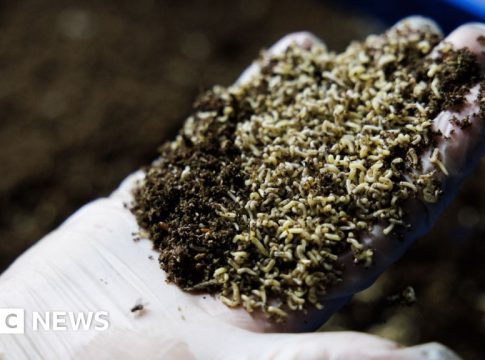Dine with the Daring: Fly Larvae Revolutionizing Food Waste Management
When you think of flies, you might picture them buzzing around your picnic or rummaging through your banana peels. But in the city of Vilnius, Lithuania, these pesky critters—more specifically their larvae—are turning food waste into a gourmet opportunity!
Maggots on a Mission
Meet the stars: Fly larvae, affectionately dubbed "maggots," are becoming the unsung heroes of waste management. Energesman, a pioneering waste management company, has embarked on a fascinating journey to process the city’s 2,700 tonnes of food waste annually, transforming it into protein-packed larvae that serve various industries—including animal feed and innovative products.
Maggot Magic: These tiny powerhouses can consume over 11 tonnes of food waste in just a few days, making them a perfectly efficient solution to manage waste. Imagine blitzing a 16-inch pizza in two hours! According to CEO Algirdas Blazgys, the city saves about €2m ($2.3m) yearly as they convert trash into treasure.
Orange Bags, Big Change
Get the scoop: Residents of Vilnius are now sporting bright orange food waste bags, a part of a lively marketing campaign to encourage responsible waste separation. The goal is to boost the mere 2,700 tonnes collected, compared to an estimated 40,000 tonnes of waste generated! Through necessary changes and innovative ideas, Energesman is ready to fly into new territories with their creative visions.
The Fly Lifecycle in Food Waste
- Fast Reproduction: A female fly lays 500 eggs in her lifetime—meaning the larvae population can grow exponentially!
- Protein Factory: The larvae are generally harvested before they mature into flies, yielding a nutritious protein source for both animals and industries like paint and furniture.
From Frass to Fabulous
What happens to the leftover frass (the larvae’s waste)? It’s not just tossed aside; it turns into rich fertilizer for gardens and farms!
Beyond Borders: A Global Trend
Vilnius isn’t alone in this maggot movement. Cities worldwide are exploring similar options to tackle food waste. From Kenya’s Project Mila to Australia’s Goterra, fly larvae are proving their worth in an eco-friendly, innovative manner.
A Taste of Tomorrow in the UK
Could the humble maggot become a staple in UK councils? Larry Kotch, CEO of Flybox, argues that with proper regulations, we could see councils embracing these larvae to tackle the staggering 6.4 million tonnes of food waste yearly.
Why This Matters
The fact that over 1.3 billion tonnes of food is wasted globally is alarming. Implementing insect-based solutions not only alleviates disposal costs but curbs methane emissions while providing high-quality protein and organic fertilizer.
In this age of sustainability, embracing fly larvae could very well be the brave leap into the culinary future we’ve all been waiting for. Who knew that in the fight against waste, the solution would literally be right under our noses…and it’s quite the buzz around town!
So, next time you think of flies, consider their potential beyond the kitchen counter. Who knows? You might find yourself supporting a new wave of sustainable food practices—all thanks to the larvae!

Covers wellness, nutrition, mental health, and daily life tips.
Bio: Talia brings a background in health journalism and holistic living to help readers live better, one tip at a time.

